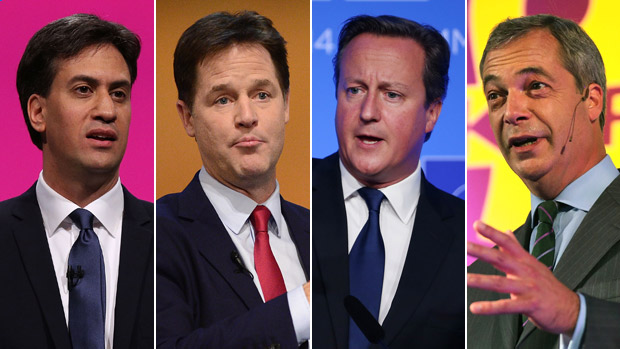Farage to join 2015 election debate – but what about Greens and SNP?
Broadcasters announce change to TV debate format, angering the Lib Dems, the Green Party and the SNP

A free daily email with the biggest news stories of the day – and the best features from TheWeek.com
You are now subscribed
Your newsletter sign-up was successful
Ukip leader Nigel Farage has been invited to join David Cameron, Ed Miliband and Nick Clegg in a live television debate ahead of next year's general election.
The new format reflects "changes in the political landscape", according to the BBC, but the decision has angered the Lib Dems, the Scottish National Party (SNP) and the Green party.
What is going to happen?
The Week
Escape your echo chamber. Get the facts behind the news, plus analysis from multiple perspectives.

Sign up for The Week's Free Newsletters
From our morning news briefing to a weekly Good News Newsletter, get the best of The Week delivered directly to your inbox.
From our morning news briefing to a weekly Good News Newsletter, get the best of The Week delivered directly to your inbox.
The general election in 2010 marked the first of a series of televised leader's debate in the UK and featured David Cameron, Labour's Gordon Brown and the Lib Dem's Nick Clegg.
However, this year a new 4-3-2 format is being introduced and will involve:
- A debate between Cameron, Miliband, Clegg and Farage, broadcast by ITV and hosted by Julie Etchingham.
- A debate between Cameron, Miliband and Clegg, broadcast by the BBC and presented by David Dimbleby.
- A head-to-head debate between the "two leaders who could become prime minister"; Cameron and Miliband, broadcast by Sky and Channel 4 and hosted by Jeremy Paxman.
What has the reaction been?
Nigel Farage welcomed the decision, saying it was reflection of the growing popularity of his party.
A free daily email with the biggest news stories of the day – and the best features from TheWeek.com
Decision is better than it could have been. If political landscape continues to change we would expect and ask for inclusion in a 2nd debate— Nigel Farage (@Nigel_Farage) October 13, 2014
Ukip supporters argued the invitation was entirely warranted as the party had consistently out-polled the Lib Dems in recent months.
The Lib Dems, however, have criticised the broadcasters for changing the format and introducing a debate that only includes the Tory and Labour leaders. "We do not accept the proposal that the Liberal Democrats, as a party of government, should be prevented from defending our record in one of the TV debates," a spokesperson told ITV.
The SNP and the Green party were also quick to criticise the broadcasters' decision.
Dear broadcasters - what about UK's third biggest political party, @thesnp? Farage invited on leaders' TV debate http://t.co/vBztiDQUSj— Nicola Sturgeon (@NicolaSturgeon) October 13, 2014
"With these statements the broadcasters are demonstrating just how out of touch they are with the public mood," Green Party leader Natalie Bennett told the BBC. "It is clear from votes and polls that the public are fed up with the three business-as-usual parties and are looking around for alternatives."
Ian Dunt of Politics.co.uk called the broadcaster's decision to exclude the Greens "unjustifiable", citing the European election results, where the Greens outperformed the Lib Dems. "It seems like a stitch-up and it strengthens the arguments of those who percieve a right-wing bias in media outlets' disproportionate coverage of Ukip."
The debates are schedule to take place on 2, 16 and 30 April, just before the general election on 7 May.
-
 Political cartoons for February 16
Political cartoons for February 16Cartoons Monday’s political cartoons include President's Day, a valentine from the Epstein files, and more
-
 Regent Hong Kong: a tranquil haven with a prime waterfront spot
Regent Hong Kong: a tranquil haven with a prime waterfront spotThe Week Recommends The trendy hotel recently underwent an extensive two-year revamp
-
 The problem with diagnosing profound autism
The problem with diagnosing profound autismThe Explainer Experts are reconsidering the idea of autism as a spectrum, which could impact diagnoses and policy making for the condition
-
 How corrupt is the UK?
How corrupt is the UK?The Explainer Decline in standards ‘risks becoming a defining feature of our political culture’ as Britain falls to lowest ever score on global index
-
 How long can Keir Starmer last as Labour leader?
How long can Keir Starmer last as Labour leader?Today's Big Question Pathway to a coup ‘still unclear’ even as potential challengers begin manoeuvring into position
-
 Three consequences from the Jenrick defection
Three consequences from the Jenrick defectionThe Explainer Both Kemi Badenoch and Nigel Farage may claim victory, but Jenrick’s move has ‘all-but ended the chances of any deal to unite the British right’
-
 The high street: Britain’s next political battleground?
The high street: Britain’s next political battleground?In the Spotlight Mass closure of shops and influx of organised crime are fuelling voter anger, and offer an opening for Reform UK
-
 Nigel Farage’s £9mn windfall: will it smooth his path to power?
Nigel Farage’s £9mn windfall: will it smooth his path to power?In Depth The record donation has come amidst rumours of collaboration with the Conservatives and allegations of racism in Farage's school days
-
 Is a Reform-Tory pact becoming more likely?
Is a Reform-Tory pact becoming more likely?Today’s Big Question Nigel Farage’s party is ahead in the polls but still falls well short of a Commons majority, while Conservatives are still losing MPs to Reform
-
 Nigel Farage: was he a teenage racist?
Nigel Farage: was he a teenage racist?Talking Point Farage’s denials have been ‘slippery’, but should claims from Reform leader’s schooldays be on the news agenda?
-
 Five takeaways from Plaid Cymru’s historic Caerphilly by-election win
Five takeaways from Plaid Cymru’s historic Caerphilly by-election winThe Explainer The ‘big beasts’ were ‘humbled’ but there was disappointment for second-placed Reform too